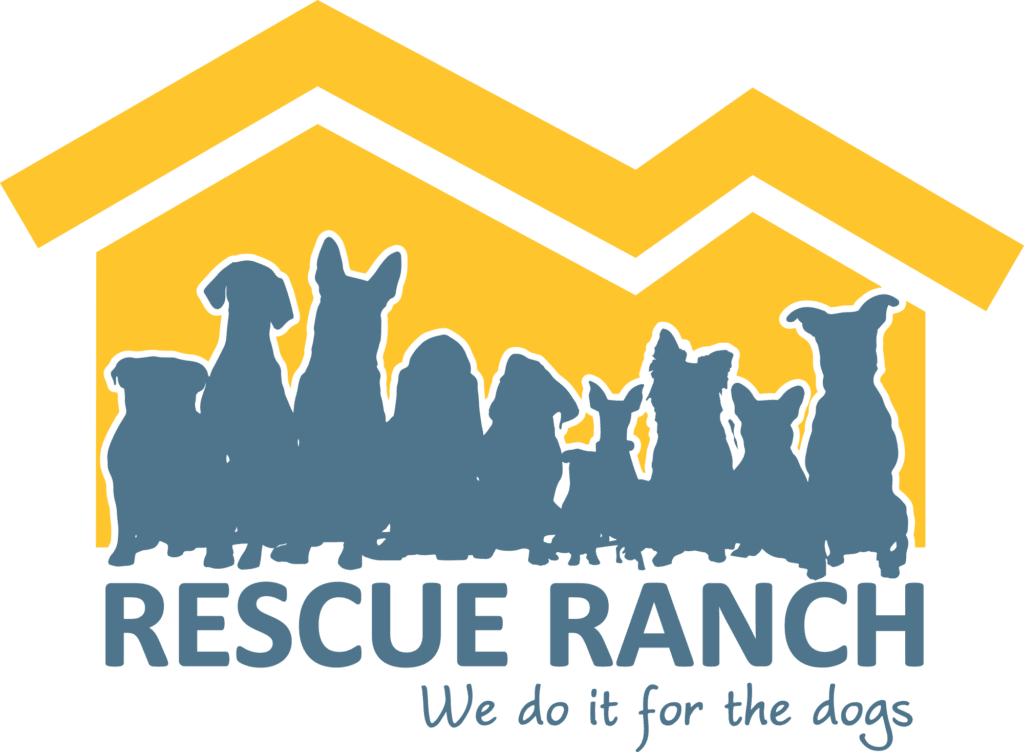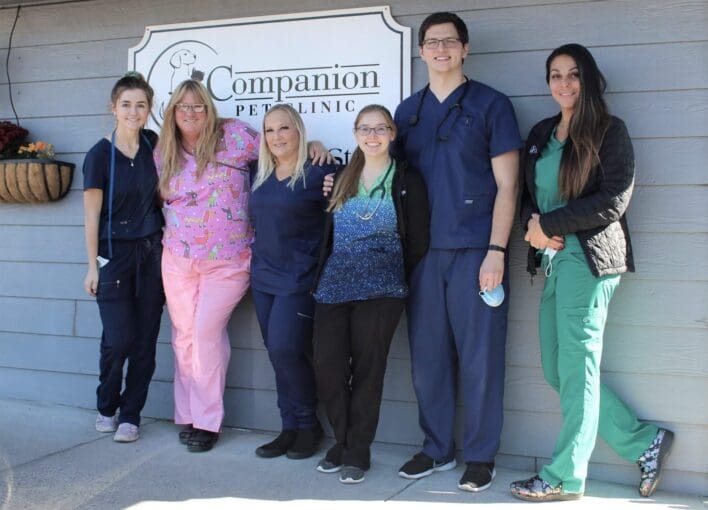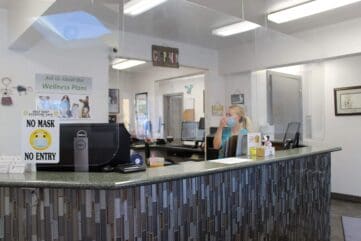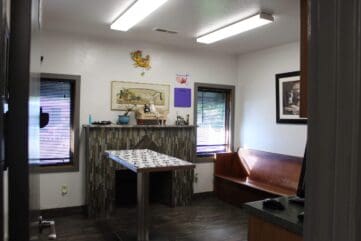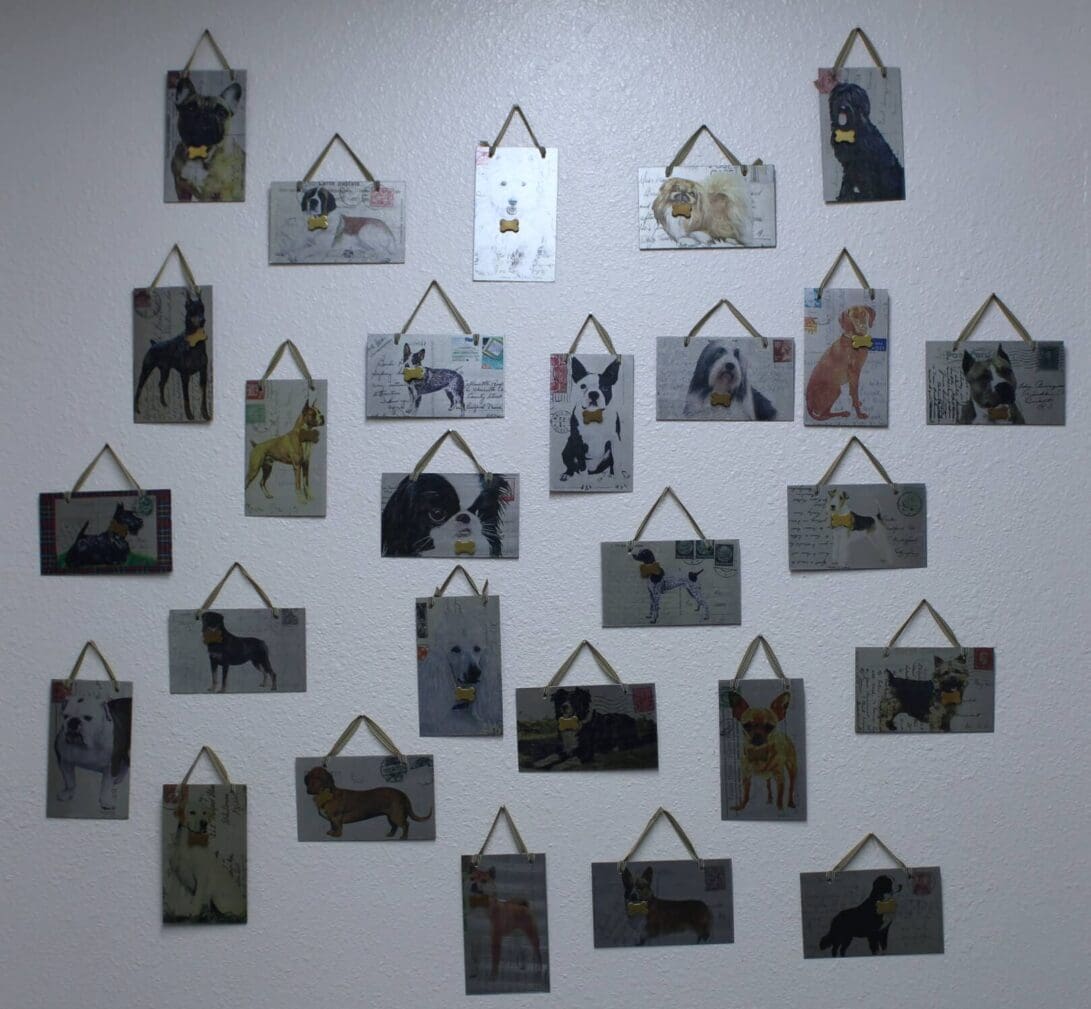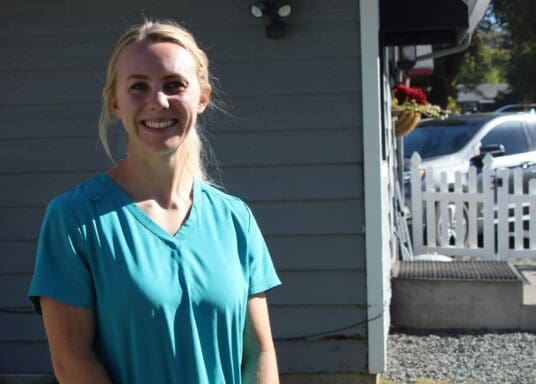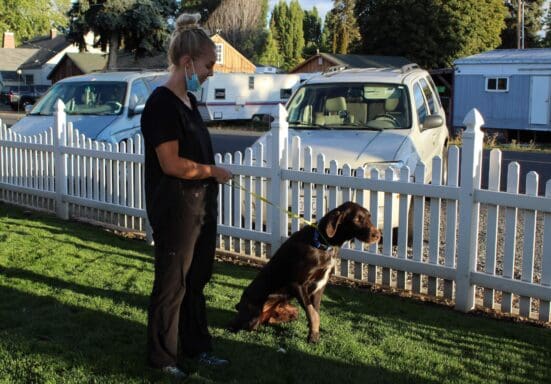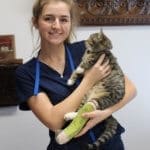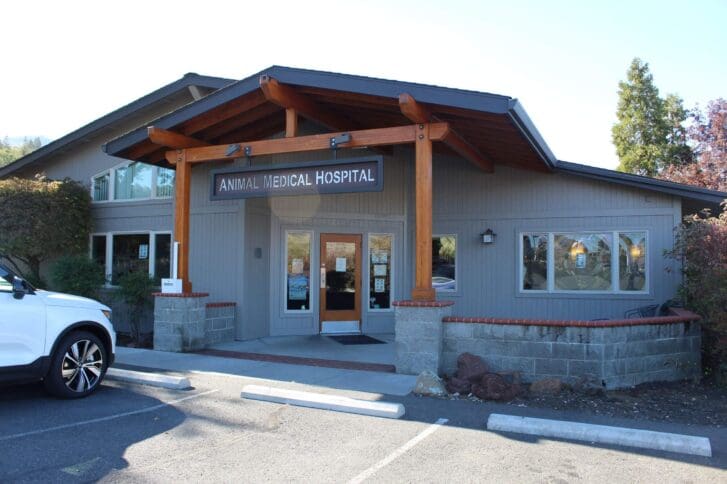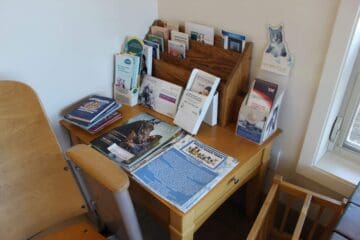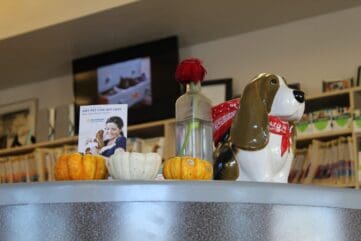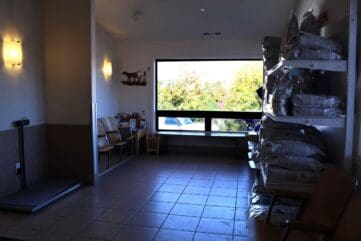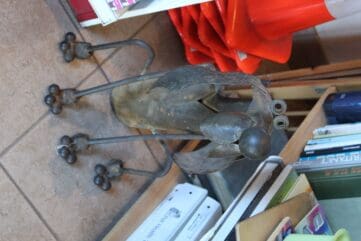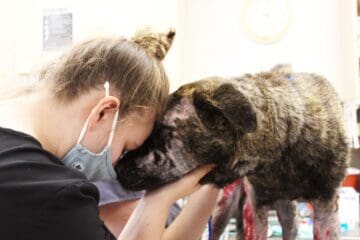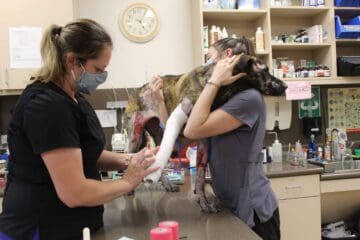Rescue Ranch depends on the help of dedicated medical professionals to do its work. Whether it’s spay/neuter, emergency cesarians, burn treatments, parasites, broken bones, undernourished puppies or simple wellness checks and rabies vaccines, we couldn’t do without medical support. October 17 through 23 is Vet Tech Appreciation week, there’s no better time for us to recognize the devoted vet techs who help treat and save Rescue Ranch Dogs.
Last Friday, I traveled to Oregon to speak to some of the vet techs we work with on a regular basis.
Companion Pet Clinic, Klamath Falls, OR
My first stop was Companion Pet Clinic in Klamath Falls, the practice that we work with for RRAAP, the Rescue Ranch Alter Assistance Program. Companion Pet is a small but very active animal practice that does mostly cats and dogs with the occasional chicken, goose, rabbit, and other small animals.
When I arrived, I stopped by the front desk and chatted briefly with Joelle Mery, the receptionist. She has worn many hats over the years, including that of vet tech. She gave me a brief summary of the staff at the clinic and got me oriented.
Elizabeth Cheyne, Surgery Tech.
I met Elizabeth Cheyne ( pronounced “sheen”) in one of the exam rooms and asked her why she had become a vet tech. She explained that, for her, it was a way to gain valuable work experience while she waited to get into veterinary school.
She has a biology degree with an option in pre-vet from OSU, where she also worked in the Large Animal hospital. When the large animal practice slowed to a halt because of Covid, she found a spot at Companion Vet. The switch to small animals was a huge change for her. At the same time, she followed up her undergrad degree with a minor in animal science.
I asked her about her work at the clinic. She said that as a surgery tech, she typically cares for the patient. She does bloodwork, monitors pets during surgery, observes them under anesthesia, pulls drugs, takes care of them in recovery and consoles them when they’re in pain or disoriented.
Elizabeth says that she hopes to eventually specialize in horse reproduction. She has four horses of her own and is interested in having her own large animal practice. That being said, she says that Companion Pet it has been a very good experience and that she has “learned a ton”. She says that after this, she’s not averse to the idea of a mixed practice.
Chessa Orr, Room Tech
Chessa Orr’s career path is quite different from Elizabeth’s. She didn’t plan to work in the veterinary field at all. She studied geoscience and science a Chico State and planned to work at a national park somewhere. But the pandemic changed everything.
With the country shut down, she started looking for other options. A friend who worked at the clinic recommended she apply and, in her words, she “ended up loving it. I never, ever, ever pictured myself doing this … crazy how things work out!”
I asked if her science background helps. She said it does to some extent, but added that her most relevant experience came from working at a Wildlife Refuge.
As a technician for Dr. Jean-Paul Reboulet, she assists him with his appointments in the exam rooms, as well as emergency surgeries and small procedures.
I asked what it took to be a vet tech. She replied that obviously a love of animals is a basic requirement, as well as a strong work ethic and a willingness to talk to people, because techs are often the ones who interface with the public. They discuss matters with owners, give information about post operative care, help people make decisions or discuss financial options.
I asked if she was interested in becoming a certified technician. She said that no, she wasn’t at the moment, although she hadn’t closed the door on the possibility. But it would mean going to school or doing an online program while working fulltime. She said that right now, she’s just really happy where she is and thoroughly enjoying her work.
Ashland Animal Medical Hospital, Ashland, OR
When I finished up at Companion Pet, I traveled to Ashland Animal Medical Hospital. Rescue Ranch has been working with them for several years, now. Although they used to do birds and other small animals they are now exclusively a cat and dog practice. I first met some of their vet techs when I visited Lady, the dog that was severely burn in the Lava Fire at end of June.
Kayla McLean, CVT
When I spoke to Kayla, she had just celebrated 12 years at AMH the previous Saturday. I didn’t really need to ask her if she enjoyed her job, she clearly does.
Kayla’s career has evolved differently from either Elizabeth or Chessa’s. She started her career in the veterinary practice as a kennel technician when she was just 17. She worked her way up from there.
She had thought she would go to vet school after college, but discovered that she really liked the hands on part of the job. So, she chose to certify instead. That way she could keep doing what she loved. As a CVT she can perform more procedures, like skin sutures, and she can even administer the rabies vaccine, as long as a doctor signs off on it.
Kayla also spoke enthusiastically about C.E. courses and how they allow her to stay current with the latest information and techniques.
I asked her what it was that she loved so much about her job. She replied that, as a technician, she gets “to do.” She added, “I love drawing the blood, placing catheters, scrubbing for surgery, taking the X rays, anything I get to do with that patient, I love to do. [I] like physically being in there and helping them; help[ing] those ones like Lady feel better and get better.” Another feature that she really values about her job is that no two days are alike.
Kayla is currently working on acquiring a specialization in Clinical Practice.
Nicole Chandler, CVT
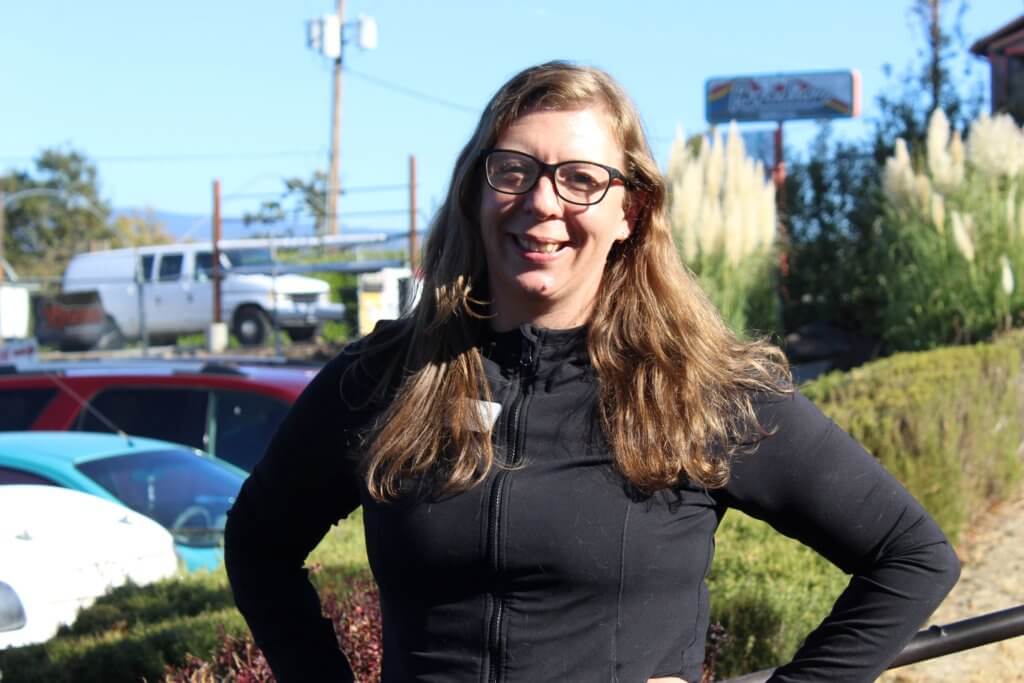
Next, I spoke to Kayla’s colleague, Nicole Chandler. Nicole is a recently minted CVT. She has passed all the requirements and is just waiting for the paperwork to come through. That being said, she’s been working as a vet tech at AMH for seven years.
Interestingly, she came from a career in retail. It was completely unrelated to the medical field. When I asked her what had prompted such an unusual career change, she told me that after 10 years in retail, she wasn’t where she wanted to be. She wanted to do something more meaningful and with greater opportunity.
She loved animals and she had always had an aptitude for biology and chemistry, so she decided to try for a position at a vet clinic. It wasn’t easy, she put in a lot of applications. Then, on her second try, she was called in for an interview at AMH and got the job. She cross trained as a receptionist and an assistant tech, working both sides of the hospital.
Now, seven years later, after putting in the hours and a lot of hard work, she’s a CVT and she loves it. Like Kayla, she likes to do the procedures. “I like the hands on care,” she said. She also talked about how much she enjoys her rapport with pet owners. And she still fills in at the front desk when they need help.
Having just finished qualifying as a CVT after years of study while working full time, Nicole is enjoying the moment. Although she’s intrigued by some of the technician specialities, she isn’t planning to go down that route any time soon. “I’m happy with being a certified tech,” she said.
They may have followed different paths but vet techs have a lot in common.
What I found fascinating about these interviews is how open the field seems to be. Each of these talented individuals followed very a different path to arrive at a similar place.
Whatever their background or ultimate career goals, it seems that vet techs in general share some common characteristics. They enjoy “doing,” they’re dedicated hard workers, they want to help their patients in any way they can, and they care deeply about the outcome.
When I asked them what their biggest challenge was, everyone I spoke to said that the hardest part of the job is when they can’t save the patient. Some said that maintaining a certain amount of emotional distance, or remembering how many more animals they save, is helpful when the going gets tough. It’s never easy.
At Rescue Ranch we really appreciate all of the vet techs who help us save and improve the lives of our dogs. Thank you.
